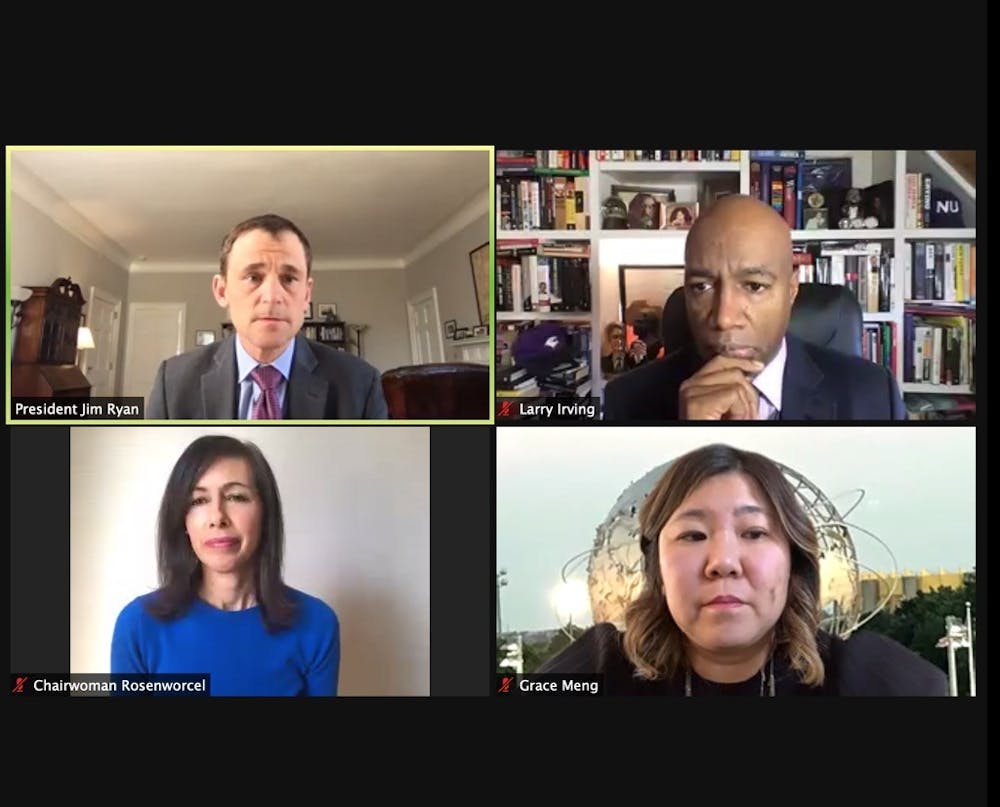The School of Education and Human Development held a panel focused on addressing barriers to equitable distance learning Thursday. The panel discussed how to address the barriers to distance learning, such as lack of broadband networks in many rural areas and affordability, faced by millions of students in the United States.
The panel featured Congresswoman Grace Meng, FCC Acting Chairwoman Jessica Rosenworcel and Larry Irving, administrator of the National Telecommunications and Information Administration under President Clinton. University President Jim Ryan moderated the discussion.
The panelists discussed the nation’s “digital divide” — where many low-income urban and rural areas, especially those populated by communities of color, lack basic internet access, in stark contrast to the millions who may take their access to reliable internet for granted. According to panelists, this divide has consequences for millions of students in school because it puts them at an academic disadvantage by impeding their access to learning in classrooms and completing online homework assignments.
“Kids who have the intelligence and the talent won’t have the opportunity to succeed as much,” Irving said. “[It’s] not because of their own fault, but because they don’t have the necessary tools.”
Irving believes the existing ways of addressing the issue is not enough, as he said “we have been fighting the rural problem instead of the poverty problem.”
Irving also expressed that he felt reassured about the possibility of addressing the digital divide moving forward with the advent of the Biden administration, but said that the nation requires both “the will and the wallet” to tackle the issue. During the Trump presidency, Irving said that there was a less than satisfactory effort to address either problems around online learning or internet accessibility.
The panelists emphasized that the pandemic’s forced transition to online learning has exacerbated the digital divide, making disparities among racial and socioeconomic classes that much clearer.
“I was surprised to see the same issue appearing in very different regions — teachers could teach with new tools, but when they assigned homework, they couldn’t be confident that all students would have access to it,” Rosenworcel said.
Rosenworcel called this phenomenon the “homework gap,” which refers to students without reliable access to broadband internet at home, and believes it necessitates attention as a matter of educational equity. According to Rosenworcel, 16 to 17 million students fall into the homework gap because of lack of access to online educational resources.
Rosenworcel said that the E-Rate program — which was created as a byproduct of the 1996 Telecommunications Act to make sure schools and libraries all over the U.S. had access to the internet — needs to be expanded to homes so that students are connected at all times, making sure that “no child [is] left offline.”
Rosenworcel also discussed smaller-scale solutions, such as allowing students to borrow Wi-Fi hotspots from the library, blanketing communities with broadband to make sure every student has access to the internet and using a “WiFi on wheels” system, which involves installing routers on school buses that then stop in areas with low internet accessibility.
Meng said she has appreciated the recent increase in interest in internet accessibility as a result of the pandemic. Before then, she pointed out that discussions about equitable access to education and opportunity were based upon an assumption that everyone has reliable access to the Internet which, Meng said, should be considered a human right in this day and age.
“We have an inherent duty to make sure our students have the tools that they need to succeed,” Meng said.
The panel also discussed the barriers that impede networks from expanding into rural areas, including a lack of sufficient and focused spending by the federal government on infrastructure. According to Irving, the immediate need is not only getting people online in the short term, but making sure there is an affordable way of keeping them connected in the future as well.
Meng brought some optimism into the discussion with her explanation of a bill being prepared by the Rural Broadband Task Force — led by House Majority Whip James E. Clyburn — which includes a proposal to use $100 billion to build high-speed broadband infrastructure in underserved communities.
The panel also addressed the importance of access to broadband internet beyond students, including its impact on the economy and on employment. Irving pointed out that the economic disparities, such as increasing unemployment among blue-collar jobs, exacerbated by the pandemic have a lot to do with people’s access to technology, especially for those whose jobs don’t allow them to conveniently work from home. As an example, Irving honed in on Queens, where small businesses who could not continue their business online were forced to close.
Still, Rosenworcel said that there have been some of the positive sides of the shift to online because we are “starting to understand what’s possible” with the Internet, especially in reference to telehealth services, which have greatly expanded amid the pandemic. However, it’s still necessary to “reach some communities who have been left behind.”
In response to a question from the audience, speakers said that “making noise” is one of the biggest catalysts in introducing new legislation and driving change. Rosenworcel also emphasized the importance of collecting data on students’ internet access.
“If school districts count which households are connected and which are not, it could help the government assess the size and shape of the digital divide and what exactly needs to be done in response to it,” she said.







